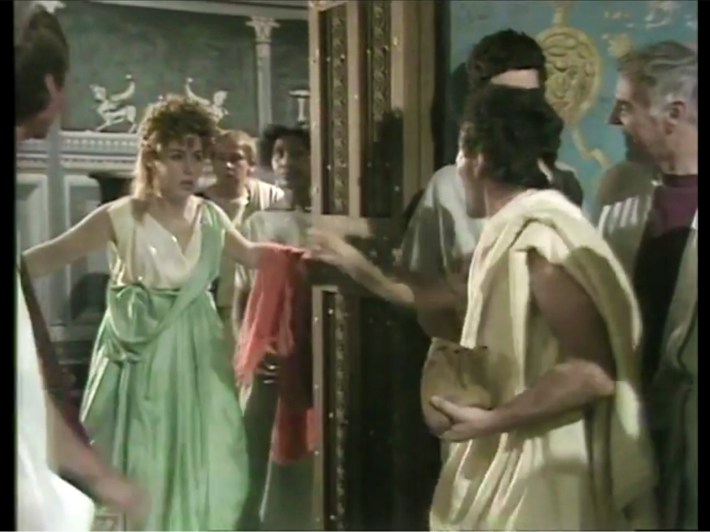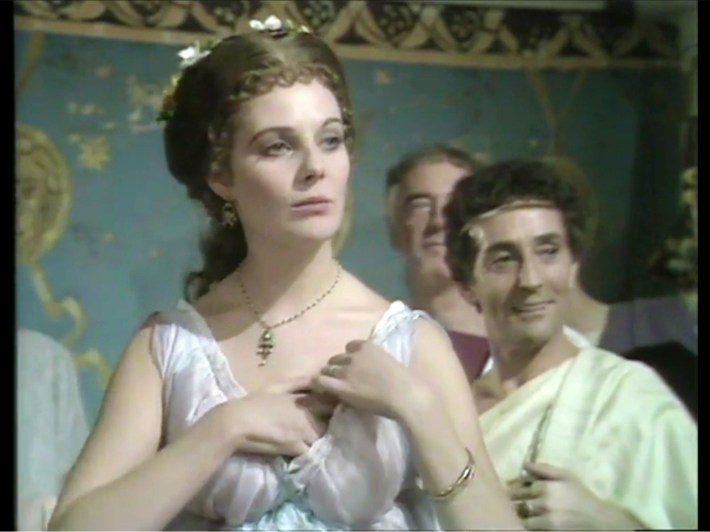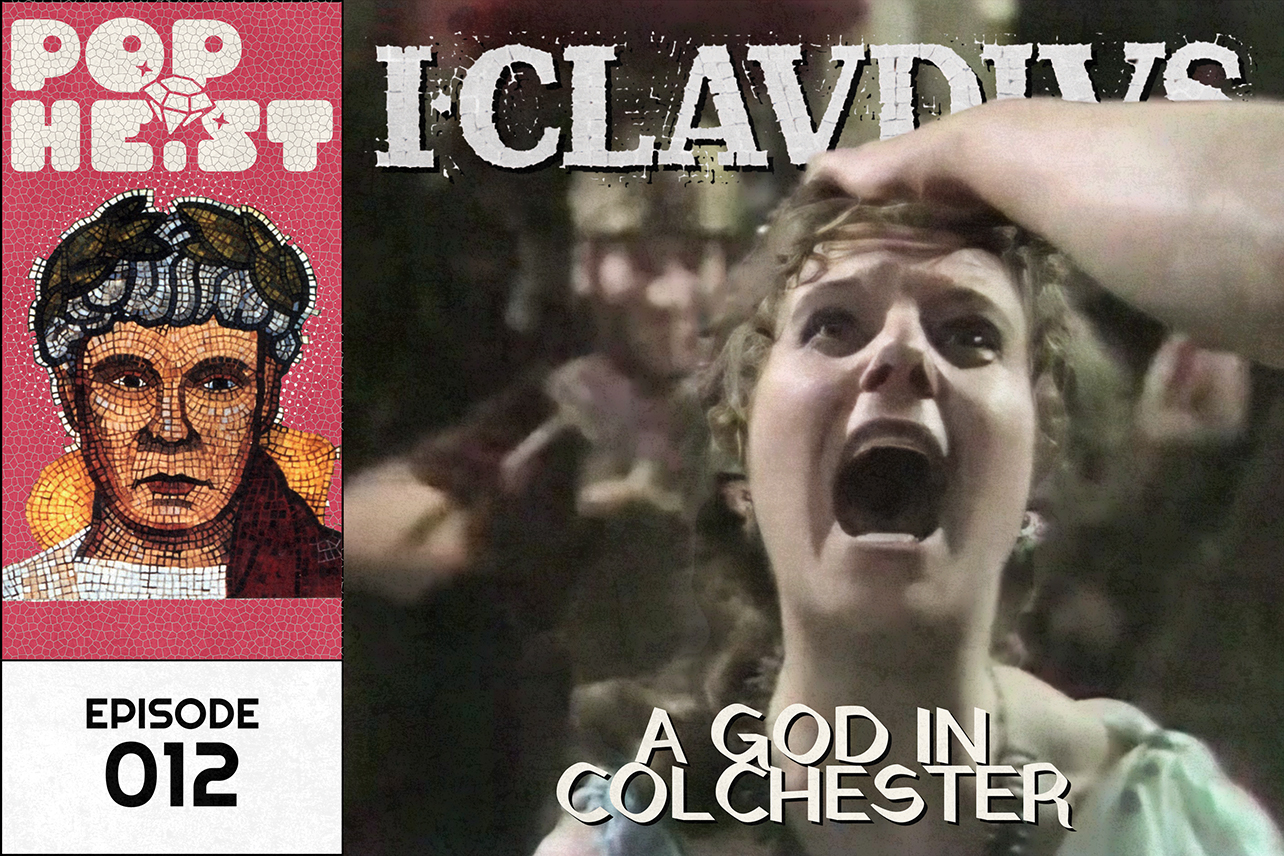In PRESTIGE PREHISTORY, Pop Heist critic Sean T. Collins takes a look at classic TV shows that paved the way for the New Golden Age of Television — challenging, self-contained series from writers and filmmakers determined to push the medium forward by telling stories their own way.
I, Claudius Episode 12
"A God in Colchester"
Original Airdate: November 29, 1976
Writer: Jack Pulman (based on the novels I, Claudius and Claudius the God by Robert Graves)
Director: Herbert Wise
Cast: Derek Jacobi, Sheila White, Bernard Hepton, John Cater, Nicholas Amer, Charlotte Howard, Moira Redmond, Jo Rowbottom, Stuart Wilson, James Faulkner
We've met a lot of bad people over the course of I, Claudius. Ha, that's putting it mildly! Serial killers, mass murderers, pedophiles, poisoners, pathological liars, tyrannical thugs — we've seen them all, often several at once, all without needing to leave the palace grounds. Their names live in infamy: Livia, Tiberius, Sejanus, Livilla, Caligula, and now Messalina, our dear new friend. (Ours and half of Rome's.)
But time after time, when confronting these creeps, their victims and their enemies muster the courage to make a powerful pronouncement. None of these men and women are the cause of what's wrong with Rome, not even when they're giving orders to make it even wronger. They're a symptom. Autocracy is the underlying disease. The never-ending parade of degenerate emperors and their psychotic female counterparts? They're opportunistic infections, destroying a body politic infected with a virus called "dictatorship" decades earlier, by the Divine Julius and the God Augustus themselves. There's no curing what ails the Roman Empire when Empire itself is the disease.
Never has that been more apparent than it is now that Rome finally has a half-decent Emperor. This episode takes place entirely during the reign of Claudius — a learned man and a kind one, a shrewder politician than he looks, a person with genuine attachment to Rome and its people, not merely the trappings of its power. Even with our lovable title character in charge, the rot continues to spread.
It's tempting to lay all the blame on Messalina. (Not as tempting, apparently, as it is to simply lay Messalina, but you get the point.) With Claudius out of town on business — that's one way of putting the reconquest of Britain — his young, gorgeous, insatiably horny wife is free to run amok. Chief among her lovers is Mnester (Nicholas Amer), a popular Greek actor, but he's hardly alone, even before the pair of them concoct the kind of sexual scenario that still freaks people the hell out two thousand years later.

Recognizing and delighting in the fact that Messalina loves to fuck so much that she feels she could take on every man in Rome, Mnester puts an idea in her head: Why not try it? Why not make a contest of it, in fact? On one end of the bed: Messalina, wife of Caesar. On the other: Scylla (Charlotte Howard), the president of the Guild of Prostitutes and, by all accounts, a regular fuck machine. Whoever has sex with the most men in a day without tapping out will be judged the winner.
The resulting scenes, in which the two women match sexual wits with Mnester tossing in his little bawdy japes and bon mots all the while, are among the raunchiest and funniest in the history of the show. There's a great exchange before the festivities begin in which the tough-as-nails Scylla demands payment for her participation: This is her career, after all, whereas for Messalina it's just a hobby. "My hobby happens to be gardening, for which I don't expect to be paid," she wisecracks.
But sometimes a seasoned pro goes down in defeat to an enthusiastic amateur. When we rejoin the scene at the end of the night, Scylla staggers away, disheveled and thoroughly amazed by Messalina's inexhaustible appetite and physical stamina. "She's inhuman!" the President of Prostitutes exclaims. "Her insides must be made of old army boots!"

It should be noted here that Sheila White, the beautiful actor playing Messalina, is frequently shown nude throughout this episode, as are her male lovers. Her fuckathon battle with Scylla is described with shocking frankness, and when you see the aftermath – Scylla, her hair mussed, her chest slicked with sweat or saliva or, well, you know – there's no question what has taken place. I kept reacting like Tim Robinson in that one I Think You Should Leave sketch: "I don't know if you're allowed to do that."
What Messalina is up to is risky business, that goes without saying, but it's not just risky for her, or for her countless sexual partners. It's risky for Claudius' cowardly advisors, Pallas and Narcissus, I, Claudius' answer to Rosencrantz and Guildenstern. They know that if they tell him, he's going to believe whatever story Messalina tells him instead, and they're as good as dead. (This happens to some poor bastard who informed to the wrong person and effectively signed his own death warrant. "What can a dead man do?" Pallas asks him rhetorically when the soldier asks for help. "Go and get buried."

But it's risky for Claudius, too. When Messalina falls for Gaius Silius (Stuart Wilson), a consul-elect with republican sympathies and looks to die for, the last of her restraint vanishes. She proposes marriage, divorcing Claudius by letter while he's inspecting the Ostia harbor and having an orgiastic wedding celebration for all the city to witness.
This isn't just some elaborate, spiteful act of cuckoldry, mind you: It's a deliberate message being sent to everyone that the emperor's own wife thinks he's too old, too corrupt, and too stupid to rule his own household, much less Rome. Paired with a popular politician, she'll have the power and the sympathy in the Senate to overthrow Claudius and restore the Republic. This would be nice, except for two things: Claudius, republican at heart though he is, would have to die, and the Republic would be in the hands of Messalina via her new husband.

Now it gets down to nut-cutting time. Narcissus and Pallas know the moment can no longer be put off: Claudius must be told what all of Rome already knows about his wife. Still afraid, they enlist the help of the one person left in Rome whom Claudius will trust: Calpurnia, his prostitute friend and sometimes lover. Even she collapses in sobbing fits, pleading "Caesar!", so convinced is she that her friend will execute her for daring to impugn his wife. Fortunately, Pallas and Narcissus are there to back her up, and now Claudius knows the terrible truth.
It's a crushing blow for Claudius, ordering the arrest of his wife and consul and their wedding revelers. He counted Messalina among the great loves and confidantes of his life, like his long-gone relatives and friends Postumus and Germanicus and Castor, like his mother, like Calpurnia…and like Herod Agrippa, his oldest and closest friend, until recently.
Now back in Jerusalem, Herod is gripped by religious fervor and driven by prophecies of a Jewish messiah. Caligula thought he was the savior in question, while we're told the last leading candidate was a rabble-rouser named Joshua Bar-Joseph who tried to start a new religion and got himself killed over it, though he still has followers whom Herod is persecuting. ("He was also called Jesus by the Greeks.") Believing he fulfills the prophecy's conditions – he too was born in Bethlehem, for example – he's begun fortifying the city and forging alliances with other Eastern kings to rise up together and overthrow Roman rule.
Claudius is hurt, as you can imagine – but the report that Herod fell ill and died just before he could proclaim himself saddens him even more. He receives a repentant letter from his old friend, written before his death, asking the Emperor to believe that he truly did love him, "my little marmoset." He reiterates the warning he gave Claudius before departing for Jerusalem last episode, a warning he was sure to apply to himself even then: "Trust no one."
Which brings us to the fate of Messalina. She's convinced, correctly I think, that Claudius would never refuse to see her and never order her execution…which is why Pallas and Narcissus take care of this for him. Making sure he's good and drunk, the two men have him sign a ream of documents which turns out to include his own wife's death warrant. It's their hope she'll do the honorable thing and kill herself, thus sparing them the, er, awkward business of explaining the warrant to Claudius when he wakes up hungover the next day.
Messalina does no such thing. She simply can't go through with the physical act of self-destruction. So a soldier rears back his sword arm to decapitate her, Messalina screams "NOT MY HEAD!!!", and a hard cut sends the camera swirling with the swing of the blade. You can feel the brutality of it, even if you don't actually see it happen. It's Messalina's final cut.
All that's left is the crying. The next day, Pallas and Narcissus explain to Claudius where his wife has gone, then attempt to soften the blow by happily reporting the conquered Britons have declared a temple in his honor up in Colchester. Claudius waits until they depart, then opens his mouth like a hole in the world – an echo of Messalina's last scream – and sobs.

So let's take stock. Claudius, who believes in the Republic, prevents its return when he unwittingly signs a series of execution warrants while drowning his sorrows. Pallas and Narcissus are undoubtedly right that this was the right move in some sense: Claudius' life was at risk, as were those of his advisors and friends. I'm not sure Messalina fully thought through what might become of her children, the Emperor's direct descendents and as Julio-Claudian as anyone, if her scheme fully succeeded. Perhaps she was counting on her personal charisma to safeguard them.
But that's the problem: People's lives should not depend on the whims of powerful individuals. Individuals can be cozened, seduced, intimidated, deceived. They can act out of pique, vengeance, lust, pure stupidity. Now, when they come for you and yours, there is nothing standing in their way. Herod Agrippa may have tried to fortify Jerusalem against Rome, but Rome's own walls against disaster fell long ago.
This recap was originally accessible to paid subscribers only, and future recaps in this series are available now for paid subscribers. If you haven't already, consider supporting worker-owned media by subscribing to Pop Heist. We are ad-free and operating outside the algorithm, so all dollars go directly to paying the staff members and writers who make articles like this one possible.






